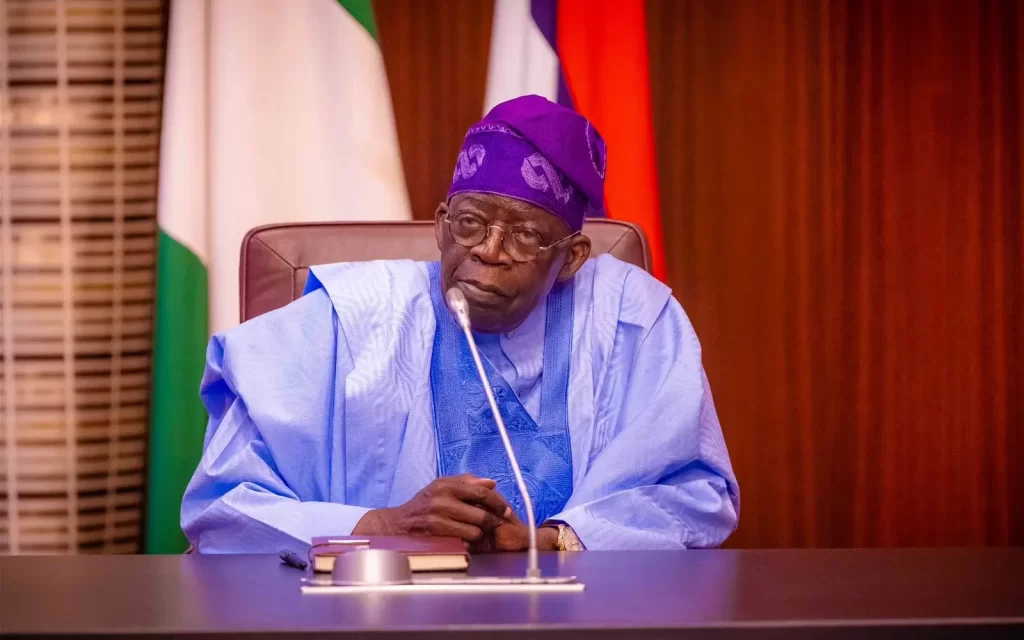Nigeria president pleads for ‘patience’ amid tough economy
3 min read

Nigerian President Bola Tinubu has called for “patience” from citizens as the country faces significant economic challenges. In his recent speech marking Nigeria’s 64th independence anniversary, Tinubu defended his administration’s controversial economic reforms, asserting that they are necessary for long-term stability and are beginning to show positive results.
During his address, Tinubu acknowledged the struggles many Nigerians are enduring in these trying times. “I am deeply aware of the struggles many of you face… I plead for your patience as the reforms we are implementing show positive signs, and we are beginning to see light at the end of the tunnel,” he stated. However, this plea comes amid widespread dissatisfaction, with protesters in major cities like Abuja and Lagos using the independence celebrations to voice their discontent over the government’s economic management.
Since taking office last year, Tinubu has made sweeping changes to Nigeria’s economic policies. One of the most significant moves was the removal of a long-standing fuel subsidy that had kept prices artificially low for consumers. This decision, alongside the abandonment of a fixed exchange rate for the naira—allowing it to float freely against the US dollar—has led to a sharp decline in the naira’s value. At times, it has hit unprecedented lows, exacerbating inflationary pressures on the economy.
These economic reforms have contributed to a skyrocketing cost of living, with inflation rates reaching levels not seen in nearly three decades. As of last month, annual inflation stood at a staggering 32%, placing immense pressure on households and businesses alike.
In his speech, Tinubu emphasized that his administration had no alternative but to steer the economy towards a more sustainable path. He pointed out that many countries around the globe are experiencing similar increases in living costs, suggesting that Nigeria’s challenges are not unique.
On the security front, Tinubu expressed confidence in the government’s efforts to combat violence and terrorism, stating, “I am happy to announce to you, my compatriots, that our administration is winning the war on terror and banditry.” He claimed that the government has successfully eliminated key Boko Haram commanders more rapidly than ever before.
The Nigerian military has ramped up its operations against armed groups, conducting intensified airstrikes and ground assaults. A military spokesperson recently reported that troops had “neutralised” nearly 2,000 suspected terrorists in the third quarter of the year.
Despite these assertions of progress, reports of violence and kidnappings continue to emerge, casting doubt on the government’s claims. Just days before Tinubu’s speech, local media highlighted a tragic incident where armed assailants killed at least two people and abducted 44 others in the states of Zamfara and Kaduna. Such events underline the persistent insecurity that plagues many regions of Nigeria, making citizens skeptical of the government’s success in restoring peace.
As the president grapples with both economic and security challenges, his administration is under significant pressure to deliver tangible results. The public’s patience, as he requested, may wear thin if conditions do not improve soon. The stakes are high, as the government’s ability to navigate these turbulent times will have lasting implications for the country’s stability and the well-being of its citizens.
In conclusion, while President Tinubu urges Nigerians to remain patient amid ongoing economic reforms, the reality on the ground remains fraught with challenges. With rising inflation and persistent insecurity, the president’s promises of improvement must translate into real change if he hopes to maintain public confidence and support. The coming months will be critical in determining whether his administration can effectively address these pressing issues and foster a more stable and prosperous Nigeria.
WhatsApp us